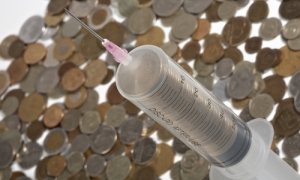Sign up for our free daily newsletter
YOUR PRIVACY - PLEASE READ CAREFULLY DATA PROTECTION STATEMENT
Below we explain how we will communicate with you. We set out how we use your data in our Privacy Policy.
Global City Media, and its associated brands will use the lawful basis of legitimate interests to use
the
contact details you have supplied to contact you regarding our publications, events, training,
reader
research, and other relevant information. We will always give you the option to opt out of our
marketing.
By clicking submit, you confirm that you understand and accept the Terms & Conditions and Privacy Policy
Although the law doesn’t yet strictly require age restrictions on who can use advanced beauty products, Sweden is responding to a growing trend. Fuelled by influencers and images in social media, many younger individuals are seeking out beauty treatments that use active ingredients.
Luxury skincare formulations commonly feature active ingredients such as alpha-hydroxy acid (AHA), beta-hydroxy acid (BHA), hyaluronic acid and vitamin A (retinol). These are popular substances for all ages today because of their alleged properties to promote skin renewal, and boost elastin and collagen production as well as improve skin texture, even-out skin tone and prevent wrinkles and fine lines.
While these advanced products often promise to improve and enhance skin, they can also have negative side effects, especially for sensitive skin. Many younger individuals are unaware of the potential risks these products may have on their skin. Media have reported that dermatologists are issuing warnings that chronic skin diseases will increase among children, because of their adoption at a very early age of skincare routines that are intended for adults and more mature skin.
What measures are being taken?
Because of these concerns, several Swedish companies have introduced age restrictions for these types of products. For instance, one Swedish pharmacy chain now enforces a minimum age of 15 years for purchasing items containing certain active ingredients without parental consent or evidence of relevant skin conditions. Additionally, a Swedish luxury skincare brand has set an age limit of 18 years for purchasing any products from its website and encouraged its resellers to do the same.
Other Swedish companies have implemented age recommendations or warnings, while some have publicly expressed their intention to move in a similar direction. Companies are also welcoming discussions with relevant branch organisations for a joint approach.
Measures are also being implemented beyond Sweden’s borders, reflecting a global trend. For instance, organisations in other countries have taken measures such as issuing warnings and age-specific recommendations for advanced skincare products.
What does the law say?
Currently, neither EU law nor Swedish law regulates age restrictions for skincare products containing active ingredients. However, as a result of rapid advancements in science and technology, the field of cosmetics, including skincare, undergoes constant legislative modification. Indeed, as recently as on 4 April 2024, the Official Journal of the European Union released Commission Regulation (EU) 2024/996, which modifies Regulation (EC) No 1223/2009 concerning cosmetic products, meaning that the new provisions entered into force on 24 April 2024. Regulation (EU) 2024/996, which has direct applicability in all member states, implements further restrictions and bans the use of certain ingredients, including vitamin A, in cosmetic products.
In addition to regulating allowed levels of the substances, labelling requirements are also introduced for products containing them to further enhance the protection of consumers. For any cosmetic product containing retinol, retinyl acetate or retinyl palmitate, the following labelling is mandatory: “Contains Vitamin A. Consider your daily intake before use”.
From 1 November 2025, cosmetic products containing the substances addressed in Regulation (EU) 2024/996, and not complying with the conditions shall not be placed on the EU market. This date is addressed to the ‘Responsible Person’, which can be the manufacturer (if based in the EU), the importer, the distributor or a third party located in the EU who has been designated by a written mandate. From 1 May 2027, cosmetic products containing the substances and not complying with the conditions shall not be made available on the EU market. The later date targets distributors of these products.
This new Regulation (EU) 2024/996 does not impose any age restrictions for active ingredients in skincare. However, given the increasing stringency of legislation surrounding cosmetic products to enhance the protection of consumers, and the fact that the industry is taking proactive measures, it is not unlikely that we will witness the introduction of regulations related to age restrictions or similar measures soon. Notwithstanding the absence of age restrictions stemming from law, we can see a clear trend towards voluntary implementation of age restrictions and similar measures for advanced skincare in Sweden.
Caroline Grotenfelt is a counsel in Bird & Bird’s corporate group and head of its retail and consumer sector group in Sweden. She specialises in M&A and corporate law.
Julia Jansson is an associate in Bird & Bird’s commercial group in Stockholm, advising local and international clients on various matters relating to commercial agreements, regulatory compliance, data protection and other matters relating to commercial law.
Beatrice Rälg is an associate in the commercial team at Bird & Bird's Stockholm office, advising a variety of national and international clients on a comprehensive range of commercial law matters.
Email your news and story ideas to: [email protected]












